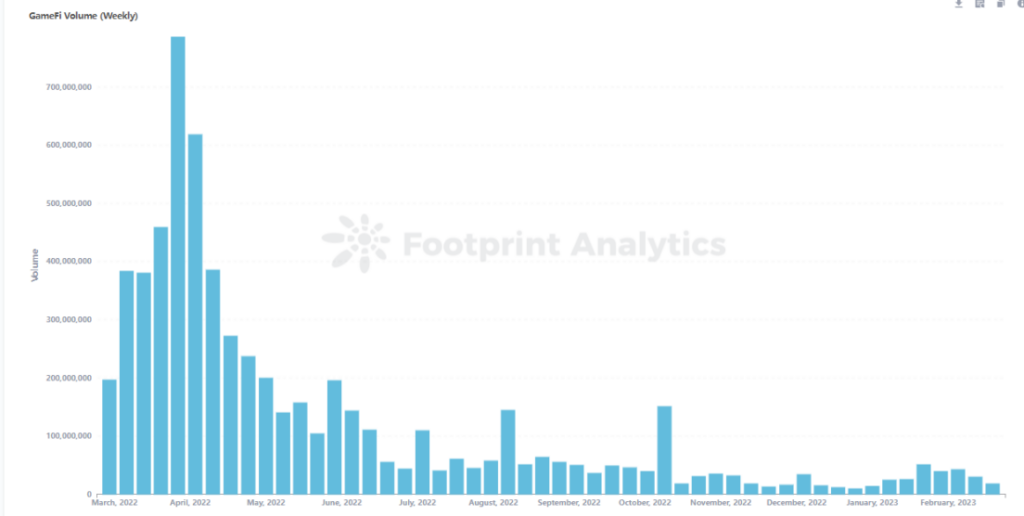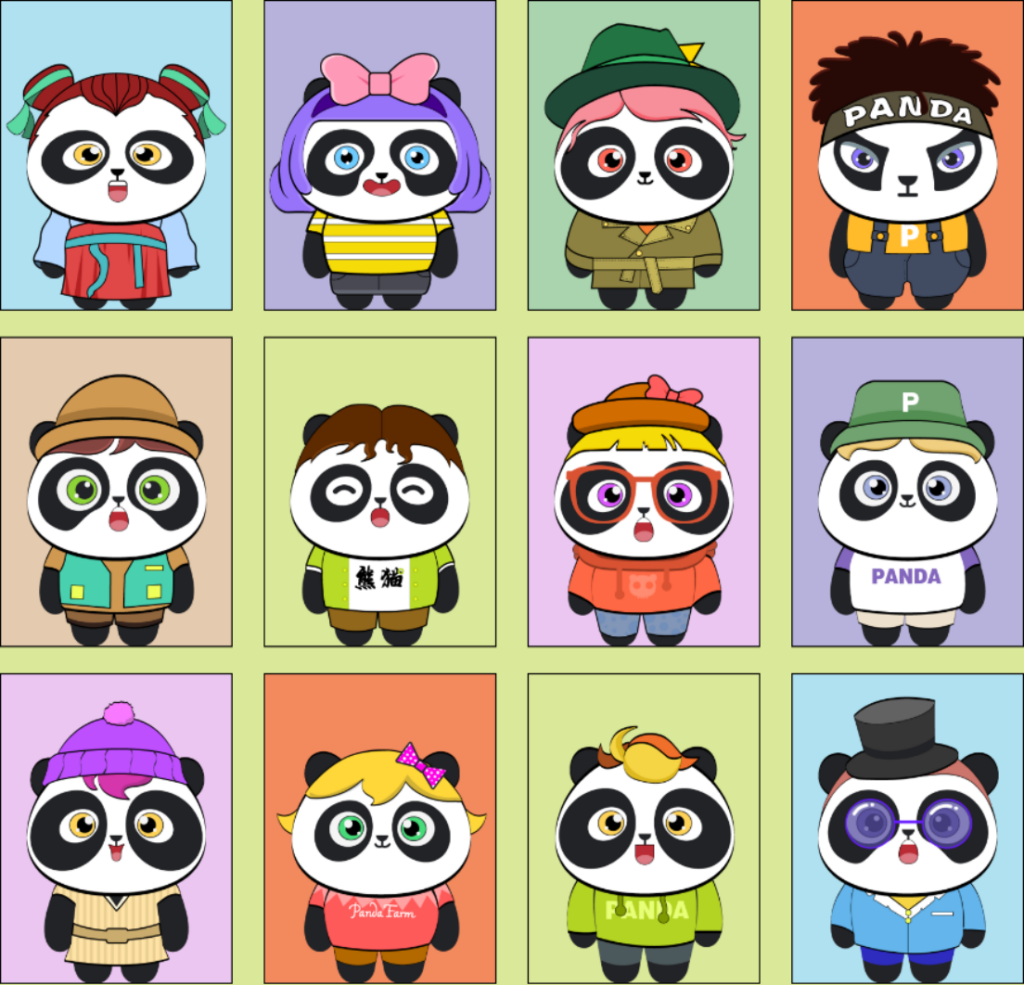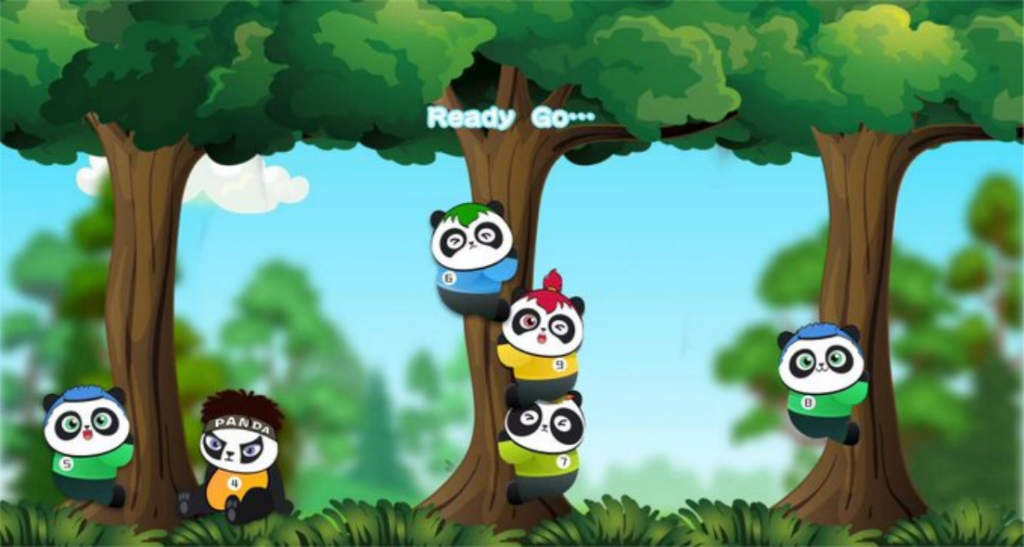On February 16, 2023, Bitget announced its newly revitalized Launchpad with its first project for the year, Panda Farm (BBO). Panda Farm is a lightweight GameFi application deployed on Arbitrum, indicative of the Bitget team’s optimism toward GameFi and relevant new projects. Indeed, the Panda Farm Launchpad generated considerable coverage and user attention on the platform.
Due to black swan events that affected the overall crypto market in 2022, there was lower enthusiasm for the GameFi track that year. After a year of “reshuffling,” GameFi has shown signs of a slight recovery in a slightly improved market in 2023. For one, the trading volume of the overall GameFi sector has seen a resurgence in the new year. Additionally, the market financing of GameFi projects is also steadily rising. The market financing of the GameFi sector was US$45 million in December last year, US$82 million in January this year, and has already exceeded US$100 million, according to February’s financial data. With the recovery of the general cryptocurrency market, GameFi is “getting ready,” too.

In addition to GameFi, Panda Farm is the first project launched by Bitget Launchpad since its revamp. Its unique narrative and compelling project made Panda Farm a definite ‘one-to-watch’ at Bitget.
Panda Farm: the first completely decentralized GameFi project, running on Arbitrum.
Many believe that 2023 will be the year of the Layer 2 explosion, particularly as it was hinted at the beginning of the year. For example, Coinbase is working on an Ethereum Layer2 network called “Base,” based on the Optimism OP stack, which has recently triggered enthusiasm in the industry for the potential of a Layer 2 track. Arbitrum also currently has the best TVL (US$3.32 billion) data in the Layer 2 ecosystem. Besides providing high scalability, efficiency, and a low-cost operating environment for ecosystem applications, it can also support asset richness and liquidity. As the first GameFi game deployed on Arbitrum, Panda Farm has the advantage of being a first mover. It can become the top game in the early stage of ecosystem development.
The gameplay and mechanism design of the Panda Farm game is simple. It uses pandas as the main characters, and players can compete with other players in real-time online games (such as battle games, nurturing games, and cultivating a panda’s home) to earn rewards. The game does not depend on strategies, but instead encourages players to “nurture” the pandas through continuous game behavior to improve their attributes further. The game itself has a high degree of user tolerance.
BBO (BAMBOO TOKEN) is the blockchain-based token of the Panda Farm ecosystem. It’s used to adopt pandas, exchange pandas, participate in games, and use advanced features in Panda Farm. All players will gather in the community via BBO, participate in community governance, and receive incentives. BBO will also serve as an incentive for players who participate in games and contribute to the community.
Each panda is an NFT, with 4022 in supply and never increased. Before playing the game, players must adopt (mint) a panda through ETH for use in subsequent games.

Each panda NFT has eight primary attributes: weight, agility, endurance, molar strength, vision, digestive ability, and claw sharpness. The values of these eight attributes are randomly generated during the NFT minting process. The Panda Farm supports various games, including nurturing and battle games. The types of games consume different attribute values of NFTs. For example, each time a panda participates in a “big eater” competition, where it randomly consumes digestive ability, claw sharpness, endurance, and molar strength but increases experience points. The consumed attributes can be repaired through the hospital and gym in Panda Farm or by purchasing props to improve combat effectiveness. In adopting a panda NFT, there is a 5% chance of obtaining an additional prop NFT.
In addition to panda NFTs, prop NFTs in the game are essential assets, including hammers, armor, glasses, knives, sunny weather, thunderstorms, juice extractors, and bamboo peeling devices. The attribute of prop NFTs includes the probability of strengthening effects. Props can help pandas win the game or be applied to opponent pandas temporarily to reduce their win rate. For example, if player A uses the “thunderstorm” prop NFT on player B’s panda during a tree climbing competition, it will slow the speed of player B’s panda, allowing player A to win the game. In another scenario, player C may use a “juice extractor” and “bamboo peeling device” to prop NFTs on their panda during a big eater competition. In this case, they could increase their panda’s digestive ability, molar strength, and endurance, helping them win the game.
Foodie competition
The foodie competition allows players to compete against other pandas in a food contest. The more food a panda eats and the better it digests, the higher its chances of winning. At the beginning of the game, players select a panda to compete and bet any amount of ETH as part of the prize pool (participation in the Panda Gourmet Game is through ETH on Arbitrum). Once ten pandas have joined the game, the competition begins. The pandas competing in the game use a combination of four out of eight attributes, including molar strength, digestion ability, stamina, and claw sharpness. The stronger the attributes, the higher the probability of winning, and the game result is calculated using an algorithm. This gameplay requires players to balance their bets on the amount of ETH and their chosen panda’s attributes to make a strategic decision.
The first-place winner of the competition receives 50% of the total prize pool, the second-place winner receives 30%, and the third-place winner receives 10%. The remaining 10% is rolled over to the next game’s prize pool, which increases with each round.
Pandas can participate in the game anytime, and each panda can participate in the foodie competition multiple times. Whether the participating panda wins or loses, it accumulates experience points, which can be used to breed high-quality offspring. That said, during the competition, pandas randomly consume molar strength, digestion ability, stamina, and claw sharpness, which can decrease their attribute values by up to 3 points. If their attribute values are too low, the pandas cannot compete and must visit the hospital, gym, or restaurant to recover.
Panda Tree climbing game
Game rules: Three pandas participate in a climbing competition to see who can climb the highest and the fastest. The panda with the best performance wins. It costs 10 BBO to participate.
Panda attributes: Includes height, weight, strength, endurance, experience, vision, and claw sharpness.
Panda props: Includes mechanical arm (strength +20), non-slip gloves (claw sharpness +20), and sunglasses (vision +20).
Special events (weather attributes): Includes sunny, rainy and foggy.
Gameplay:
This game is a multiplayer game where players compete for a prize pool. A portion of the BAMBOO tokens funds the prize pool contributed by participating players, and the rewards go to the winners. To participate, players must have a panda NFT as an entry ticket and pay 10 BBO to enter the competition. During the game, the system calculates the results for the three participating players based on the values of their panda NFT attributes: height, weight, strength, endurance, experience, vision, claw sharpness, and a random number generated in-game.
The players’ interest in the game is tied to gambling, and they have the potential to earn significant income through this mechanism. At the same time, the game includes scenarios that require BBO tokens, such as repairing the panda NFT, working out, or buying entry tickets. This means that players will consume a lot of BBO tokens when improving their panda NFT and participating in the game, creating a deflationary scenario for BBO and generating revenue for the ecosystem.
Overall, Panda Farm’s game mechanics and gameplay are simple. The game’s main objective is for players to continuously upgrade their pandas by participating in the game to obtain more potent attributes and earn rewards. The pandas’ cute design in the game also appeals to many players. Panda Farm is also more lightweight than most other GameFi games.
Panda Farm’s lightweight advantage
Existing GameFi games such as Axie Infinity often require players to purchase equipment, constantly jump in-game, and expertly navigate the gameplay and economic models, which can be highly complex and beyond the knowledge of many new players and Web2 players. As a comparison, StepN is “lighter” in that players only need to buy shoes and run to earn rewards while meeting their health goals.
Panda Farm’s breeding gameplay offers one of the lowest thresholds in the traditional gaming industry. It seems even “lighter” than the two X2E ecosystems mentioned above. As such, the demographic that Panda Farm could attract is relatively broad. It can target a broader range of age groups, which most existing GameFi projects cannot. By using more marketing and promotion strategies, it is expected to attract a more diverse range of players, not just those already on Web3. Additionally, earning rewards while playing the game makes it more attractive to players.

Of course, the lighter the product, the stronger the need to strike that sweet spot for players. This means that other benefits players can derive from the product need to be more apparent in addition to earning. Although participation may have a low barrier to entry, the product must satisfy some of the players’ underlying needs to keep them engaged. While sleeping and running are necessities, consuming idle time is an even greater necessity. For example, we usually see that most people use small games to relieve stress and pass the time during their leisure time. This type of need can be fulfilled anytime and anywhere while running or sleeping cannot. Therefore, Panda Farm can potentially appeal to players’ pleasure points strongly. As more gameplay is introduced for the pandas in the future, there is the expectation that players can stay engaged in-game, as well as generate considerable revenue.
In addition to gameplay, each Panda NFT also has the property of a collectible. After upgrading an NFT, players can sell it to interested players or collectors and profit from the premium of the NFT card. Therefore, Panda Farm is expected to attract some players with love for digital collectibles and interest in games under this theme. Ultimately, it could aid new users to become loyal users, thus generating more revenue and reducing churn rates.
Since entering 2023, the cryptocurrency industry has gradually rebounded under the driving force of the market, and GameFi has once again shown vitality. After experiencing its resurgence, this track is now developing in a new direction. As one of the few GameFi games built on Arbitrum, Panda Farm’s lightweight game ecosystem has the potential to occupy a central space in GameFi’s development.



